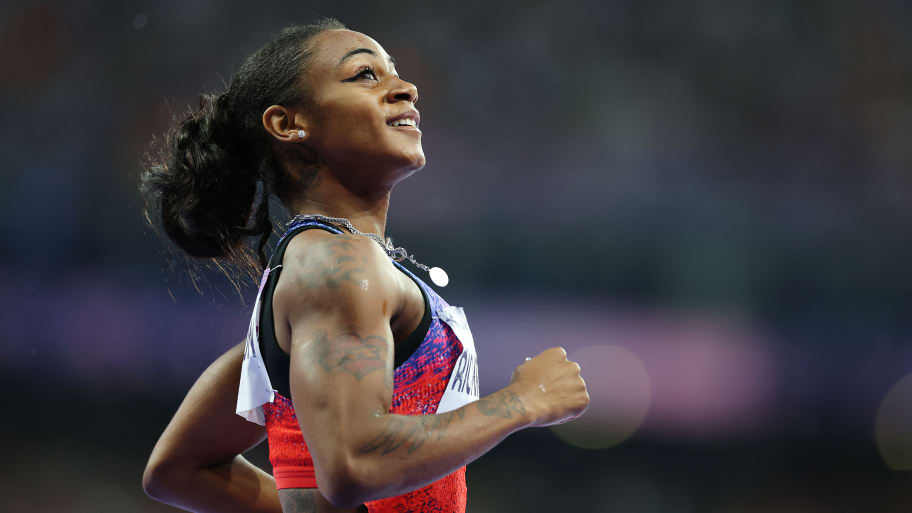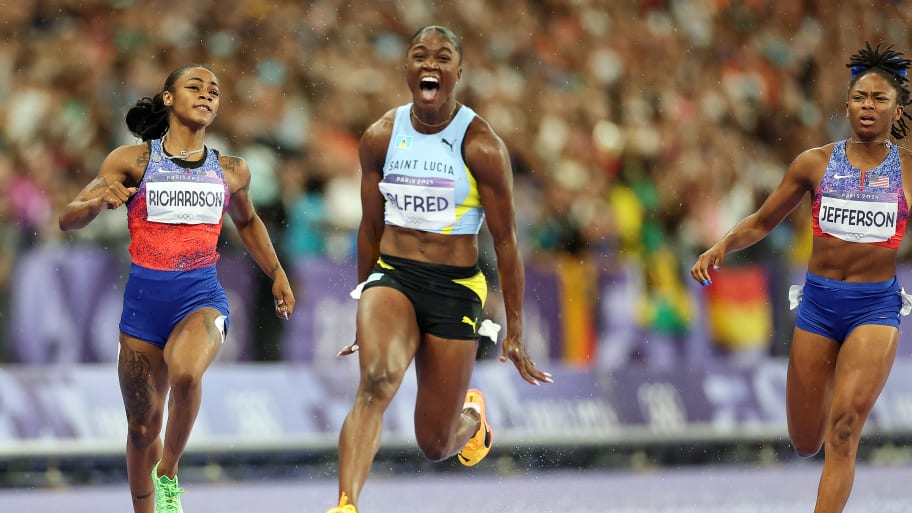
SAINT-DENIS, France — At 9:15 p.m. on Saturday, close to sunset just north of Paris, rain pelted the purple track ahead of the 100-meter women’s final. In an unfortunate twist, the roof covers the majority of the stands inside Stade de France, while covering none of the track.
It was dark inside. Cold, too. The finalists—in a race where every step matters and where one wrong one can lead to cataclysmic results—warmed up while wearing light track jackets. Camera operators filmed with umbrellas above their heads, their equipment draped in canvas coverings. The sand pit, used on Saturday evening for the women’s triple jump final, had been transformed into half mud from the rain. The lights in the upper deck flashed blue and red. In the moment, those flashes felt distinct. Later, they felt more like warnings.
Sha’Carri Richardson stalked toward Lane 7, as the last competitor introduced. At that point, just before the starting gun would sound, her face indicated she wasn’t playing, that she had not even a split-second to waste. She swayed back and forth, but less than normal. Her eyes pointed straight ahead.
Something wasn’t right.
There was a moment, shown on television, right before the sprinters took their places. At that moment, she appeared to be taking short, quick breaths. It’s impossible to know exactly what she was doing. Regardless, the image didn’t inspire confidence.
Rain or not—sprinters typically say that because of spikes and the make-up of modern tracks, precipitation matters little, while cold weather matters far more in terms of speed—they took their places. The gun sounded. And off they went.
Well, sort of. To describe Richardson’s start as poor undersells how poor it actually was. She was never exactly a shot-from-a-cannon-type starter, but she got out of her blocks in sixth place of the eight sprinters.
As the women barreled down the wet surface, she gained speed, reaching maximum velocity far later than she ever could have hoped. She would close on most of those ahead of her, passing three competitors over the final 10 meters or so. It wasn’t enough—not for gold. Not after waiting through the last Olympic cycle due to her suspension for a positive drug test. Not on a night that promised so much more.
Instead, Julien Alfred smoked the field, earning Saint Lucia its first-ever Olympic medal, in a gold-medal winning 10.72 seconds. Richardson snagged the silver in 10.87. Her teammate, Melissa Jefferson, claimed bronze in 10.94.
It was tough to read into Richardson’s reaction afterward. At first, she stared at the video screen in the top part of the stadium, her face the embodiment of disbelief. She walked, hands stuck on both sides of her lower back. Soon, she smiled, nodded and hugged her teammates, while Alfred danced in jubilation around the track. Eventually, Richardson embraced the gold medal winner. Then, she grabbed an American flag. The person who gave it to her smiled as wide as the margin Alfred won by. Richardson did not smile back.
She tried. Really, it seemed like she wanted to present grace. She did smile, while taking pictures with the other medalists. She waved the flag.
Something wasn’t right.
Richardson’s reaction didn’t, and shouldn’t, diminish what Alfred did on Saturday. After a “disappointing” world championship in 2023, she huddled with her coach, Canadian Edrick Floreal, who first met Alfred while recruiting her to Texas. His Instagram bio reads: I coach ordinary people to extraordinary accomplishments. A little too coach-centric, perhaps, but that was true on Saturday night.
“He made me believe I could be an Olympic champion,” Alfred said.
After those disappointing worlds, she moved to Jamaica. She needed a new environment, a better one, to train. She wanted to experience the greatness of Jamaican sprinters up close.
Saturday morning, she spoke and wrote her goal into existence. Around 5 a.m. inside her hotel room, she penned “Julien Alfred will be an Olympic champion” in her journal. She said the same thing aloud in an elevator.
In warm-ups and her semifinal, she felt confident. She trusted herself and the work that she had done. Then she went out and she blazed down the purple track, like the rain and her competition didn’t exist. After the triumph, when the stadium announcer told the packed house of her accomplishment in delivering her country’s first Olympic gold, she placed her right hand over her face. She was crying, understandably overcome with every possible emotion that conveys something like unbridled joy. She leaned over, wanting momentarily to hide. Both American medalists embraced her.

Richardson did not attend the mandatory post-race press conference. Neither did Jefferson, though she spoke to reporters briefly in the mixed zone, while Richardson did not. If she was proud of that silver, if those smiles were real and not manufactured for the moment, why not stop and say that? Instead, Richardson all but jogged back toward the track and never reappeared. At the post-race press conference—which almost always features all three of an event’s medalists—Alfred took questions by herself. Olympic officials said they could not comment on the situation and they did not respond to an email as of early Sunday morning in Paris.
The controversy at hand began to round into focus on social media. The Jamaica Observer posted clips of Richardson and sprint legend Shelly-Ann Fraser-Pryce earlier on Saturday, both being denied access to the warm-up track before their 100-meter semifinal races. Apparently, a rule had changed overnight, although what exactly changed hasn’t been explained yet by Olympic officials. Eventually, both athletes were let inside.
In one video that circulated widely in the aftermath, Fraser-Pryce says the person at the gate told her they’d changed the rule, same as the day before. But Fraser-Pryce says no one ever told the athletes.
Fraser-Pryce withdrew from the 100 meters. At the end of her career, that had to be more difficult than she could describe. It’s unclear if the incident earlier in the day had any affect on Richardson on the track—and she didn’t say one way or the other.
When Jefferson did stop in the mixed zone, she did not address what happened. Alfred was asked about the reports in her solo winner’s press conference but she said she focused on her coach’s instructions and her race only.
In the 100-meter race, what matters most is who accelerates the fastest. The fastest sprinters—according to Amandine Aftalion, a French applied mathematician and the director of research at Centre National de la Recherche Scientifique—reach maximum velocity at different rates, but most typically between 60 meters and 70 meters in. None can sustain that maximum velocity beyond roughly 70 meters.
Thus, it was remarkable that Richardson even caught the other runners. A silver medal in the Olympic 100-meter race is an incredible accomplishment, but surely not the one Richardson hoped for.
This article was originally published on www.si.com as Sha'Carri Richardson's Olympic Odyssey Culminates in Rain-Soaked Silver Medal.







